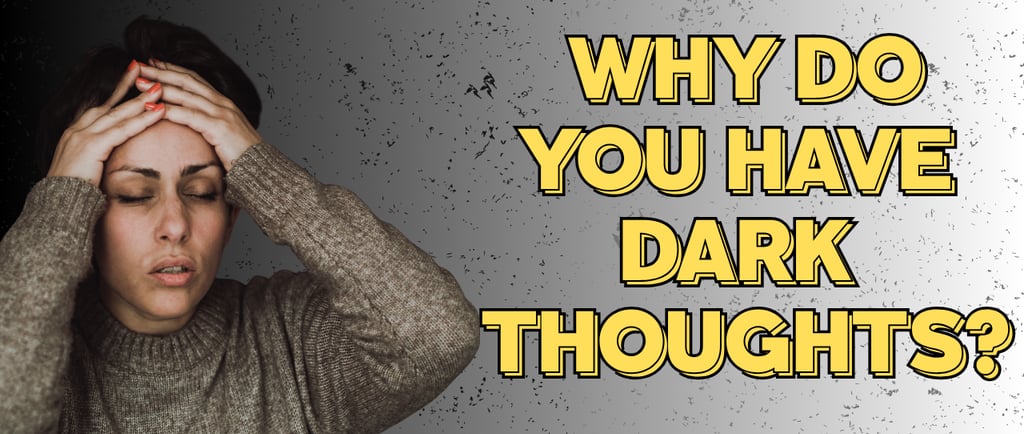How To Overcome Dark Thoughts and the Science Behind Them
Blog post description.
Sha
8/19/20252 min read


Why Do We Have Dark Thoughts? Understanding the Mind’s Shadow Side
It’s a question many of us avoid admitting out loud: Why do I have such dark thoughts? Whether it’s intrusive worries, self-critical thinking, or even fleeting violent or destructive images, these moments can feel frightening and deeply isolating. But here’s the truth, dark thoughts are a normal part of being human.
In the latest episode of The Inquisitive Wren Podcast, I explore why we experience these thoughts from psychological, neuroscientific, and therapeutic perspectives. By shining a light on this shadow side of the mind, we can begin to understand it—not fear it.
The Psychology Behind Dark Thoughts
From a psychological perspective, dark thoughts often stem from the unconscious mind. Freud described these as repressed wishes or fears that surface when our guard is down. Modern psychology, however, views them more as intrusive thoughts—mental “pop-ups” that don’t always reflect who we are or what we want.
Research shows that almost everyone experiences intrusive thoughts at some point. The difference lies in how we interpret them. People who believe that a thought reflects their character are more likely to spiral into anxiety or shame.
What Neuroscience Tells Us
Neuroscience reveals that dark thoughts can be linked to overactive threat systems in the brain, particularly the amygdala. When we’re stressed, exhausted, or overwhelmed, our brain fires up these networks, producing thoughts that mirror danger, even if no real danger exists.
The good news? Thanks to neuroplasticity, the brain can rewire. Mindfulness, therapy, and thought-reframing practices help calm the nervous system and reduce the intensity of intrusive thoughts over time.
Fear of Our Thoughts
One of the most painful aspects of dark thinking is the fear it creates: What if this means something about me? But having a dark thought is not the same as acting on it, or even desiring it. Studies in clinical psychology confirm that thoughts do not equal actions. They are mental events, not truths.
Cultural & Spiritual Insights
Different cultures approach the mind’s shadow differently. In Eastern traditions, thoughts are seen as passing clouds, not permanent realities. In spiritual practice, the appearance of darker ideas is often reframed as an invitation to grow, heal, or face what we’ve been avoiding.
In my therapy practice, I’ve often seen how combining science with spirituality helps people hold their thoughts more lightly and compassionately.
How to Manage Dark Thoughts
If you struggle with recurring intrusive or negative thoughts, here are a few approaches that can help:
Name Them, Don’t Claim Them – Acknowledge “I’m having a dark thought” rather than “This is who I am.”
Ground in the Present – Use breathing exercises, body scans, or guided meditations to bring yourself back to now.
Shift the Lens – Ask: What’s the opposite thought? Even if it feels false, it helps redirect neural pathways.
Seek Support – Therapy, hypnotherapy, or structured self-help tools can create lasting relief.
Final Thoughts
Having dark thoughts does not make you broken—it makes you human. By understanding the science, psychology, and even spirituality behind them, we can reduce their power and transform how we relate to our inner world.
Listen to the full episode of The Inquisitive Wren Podcast to go deeper into this subject, including guided practices to help you release and reframe intrusive thoughts.
Download my free guide on Transforming Dark Thoughts.
#MentalHealthAwareness #IntrusiveThoughts #DarkThoughts #Neuroscience #Psychology #Mindfulness #TherapyTools #SpiritualGrowth #PodcastEpisode #TheInquisitiveWren
Follow
Episodes
Subscribe to our newsletter
© 2025 The Inquisitive Wren Podcast. All rights reserved.


